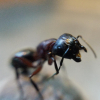- Formiculture.com
- Forums
- Gallery
- Members
- Member Map
- Chat

Foraging area too large?
Started By
T.C.
, Apr 9 2022 1:15 AM
5 replies to this topic
#1
 Offline
-
Posted April 9 2022 - 1:15 AM
Offline
-
Posted April 9 2022 - 1:15 AM
So in the years I've been in this hobby I've heard people discuss and talk about keeping foraging areas for colonies small so the ants don't get lost? And take note we are NOT talking about nest size, but the outworld or foraging area. Whichever you call it. The first time I ever heard of it I believe was from individuals quoting antscanada. I've always thought that this seemed off since wild colonies don't have restricted foraging space in the wild, and to the best of my knowledge most of them are making it home.
So I decided to put this to the test. I put three small test tube colonies in a 75 gallon wide breeder tank covered with dry gravel on the bottom. For those wondering the ants did come across eachother but just ended up panicking and running back. However all ants from all colonies didn't get "lost." They were in there for a week and no issues. So my theory is there is no such thing as getting lost UNLESS the outworld or foraging area was disturbed. And for the record the species used for this experiment was Camponotus sp.
So I decided to put this to the test. I put three small test tube colonies in a 75 gallon wide breeder tank covered with dry gravel on the bottom. For those wondering the ants did come across eachother but just ended up panicking and running back. However all ants from all colonies didn't get "lost." They were in there for a week and no issues. So my theory is there is no such thing as getting lost UNLESS the outworld or foraging area was disturbed. And for the record the species used for this experiment was Camponotus sp.
- Canadant, ANTdrew and Leptomyrmx like this
#2
 Offline
-
Posted April 9 2022 - 3:31 AM
Offline
-
Posted April 9 2022 - 3:31 AM
I agree with all this. I’ve advocated for larger outworlds for a long time on here. Most of the commercial ones are absurdly small, so I make my own mega-outworlds.
- T.C., Canadant and futurebird like this
"The ants are a people not strong, yet they prepare their meat in the summer." Prov. 30:25
Keep ordinary ants in extraordinary ways.
Keep ordinary ants in extraordinary ways.
#3
 Offline
-
Posted April 9 2022 - 8:18 AM
Offline
-
Posted April 9 2022 - 8:18 AM
I agree. How would small colonies survive in the wild if they're incapable of foraging beyond a tiny space around their nest entrance? They literally would starve to death, as food just doesn't land on top of their nest entrance like it does in captivity.
"God made..... all the creatures that move along the ground according to their kinds (including ants). And God saw that it was good. Genesis 1:25 NIV version
Keeping:
Tetramorium immigrans Camponotus vicinus, modoc, novaeboracensis, herculeanus
Formica pallidefulva, argentea Solenopsis molesta
Formica cf. aserva Lasius brevicornis, neoniger
#4
 Offline
-
Posted April 9 2022 - 3:30 PM
Offline
-
Posted April 9 2022 - 3:30 PM
Part of the idea of large outworlds being a detriment just comes from the idea that they are unnecessary for the vast majority of species/colonies. For a small colony especially, if food is placed extremely far away in the outworld, the ants may never come across it, or if they do it will require much more energy to be expended for round-trips to that food source. Social stomachs aren't indefinitely big, so more often than not round-trips are necessary to extract enough nutrients from a food source, and if a colony is needing to travel a much further distance, that is an energy cost that may be noticeable, especially in a small colony.
There is also the issue of space: not everybody lives in a mansion, and many antkeepers are young people restricted to a small space. Unless you only have a few colonies, it's quite difficult to provide every colony with all the space they could ever want.
Lastly, as someone that sells antkeeping supplies, I can say that outworlds are costly to both manufacture and ship. Making a professional-looking outworld that is large and cheap is simply not possible. It's easy for an antkeeper to buy a large storage bin from Walmart and use that, but a business selling professional setups just can't do that. That's why (at the moment) all of the nests on arthropodantics.com are sold separately from outworlds, so that if my customers would rather create an outworld by themselves to serve them and their colony's needs, available space, and budget, they can do so. At the same time, I have gotten complaints for this, as some people prefer the convenience of their nests including an outworld out of the box, so that the setup is ready without needing to connect anything else. This is part of why I'm working on developing an all-in-one nest right now.
Trust me, I am a believer in large outworlds; anybody who's seen my Pheidole rhea's setup and their 55 gallon outworld will be able to tell you that. Part of the reason I opted to make that large outworld though is because the species are extremely avid foragers, creating trails that are literally hundreds of feet long in the wild. Well, that and the fact that they are my dream species; of course I'm going to go a bit crazy on their setup, lol. It's just also worth noting that large outworlds not only can be detrimental, but also are just unrealistic for the majority of antkeepers and ant supply companies to provide/use.
- RushmoreAnts and NicholasP like this
I like leafcutter ants. Watch The Ultimate Guide to Fungus Growing Ants:
https://youtu.be/VBH...4GkxujxMETFPt8U
This video took like over 100 hours of work, you should for sure watch it.
#5
 Offline
-
Posted April 9 2022 - 4:38 PM
Offline
-
Posted April 9 2022 - 4:38 PM
Part of the idea of large outworlds being a detriment just comes from the idea that they are unnecessary for the vast majority of species/colonies. For a small colony especially, if food is placed extremely far away in the outworld, the ants may never come across it, or if they do it will require much more energy to be expended for round-trips to that food source. Social stomachs aren't indefinitely big, so more often than not round-trips are necessary to extract enough nutrients from a food source, and if a colony is needing to travel a much further distance, that is an energy cost that may be noticeable, especially in a small colony.
I'm with you on that point, although I see no problem with using large outworlds for small colonies as long as the food is placed in a predictable spot very close to the nest entrance. That way, the outworld won't have to be exchanged for a larger one if desired once the colony grows larger.
- CheetoLord02 likes this
"God made..... all the creatures that move along the ground according to their kinds (including ants). And God saw that it was good. Genesis 1:25 NIV version
Keeping:
Tetramorium immigrans Camponotus vicinus, modoc, novaeboracensis, herculeanus
Formica pallidefulva, argentea Solenopsis molesta
Formica cf. aserva Lasius brevicornis, neoniger
#6
 Offline
-
Posted April 14 2022 - 10:02 AM
Offline
-
Posted April 14 2022 - 10:02 AM
Good post TC. I've also wondered why a small outworld is suggested. If it was for spatial reasons in a home I get that, but because ants may get lost.... well I'm not sure I buy that. After all the world is a giant outworld with species of all kinds and we all know small to large colonies thrive. Yhe bigger the outworld the better for me. Insects/animals need space.
Good post TC. I've also wondered why a small outworld is suggested. If it was for spatial reasons in a home I get that, but because ants may get lost.... well I'm not sure I buy that. After all the world is a giant outworld with species of all kinds and we all know small to large colonies thrive. Yhe bigger the outworld the better for me. Insects/animals need space.
Good post TC. I've also wondered why a small outworld is suggested. If it was for spatial reasons in a home I get that, but because ants may get lost.... well I'm not sure I buy that. After all the world is a giant outworld with species of all kinds and we all know small to large colonies thrive. Yhe bigger the outworld the better for me. Insects/animals need space.
"You don't get what you want. You get what you deserve".
1 user(s) are reading this topic
0 members, 1 guests, 0 anonymous users

















